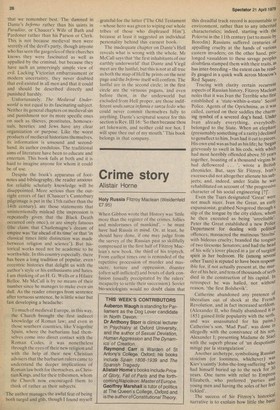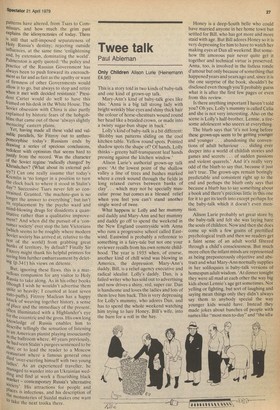Crime story
Alistair Horne
Holy Russia Fitzroy Maclean (Weidenfeld E7.95) When Gibbon wrote that History was 'little more than the register of the crimes, follies and misfortunes of mankind', — he must have had Russia in mind. Or. at least, he should have done, if one may judge from the survey of the Russian past so skillfully compressed in the first half of Fitzroy Maclean's new book, the third of his triptych. From earliest times one is reminded of the repetitive procession of murder and massacre, torture and oppression. disaster (often self-inflicted) and bouts of dark confusion (usually precipitated by the rulers' incapacity to settle their succession). Soviet bio-sociologists would no doubt claim that this dreadful track record is accountable to environment, rather than to any inherited characteristics; indeed, starting with the Polovtsi in the 11th century (set to music by Borodin) Russians suffered centuries of appalling cruelty at the hands of various eastern invaders; on the other hand, pro' longed vassaldom to these savage peoples doubtless stamped them with their traits. as has inter-breeding — the extent can be readily gauged in a quick walk across Moscow's Red Square. Tracing with clarity certain recurrent aspects of Russian history, Fitzroy Maclean notes that it was Ivan the Terrible who firg established a 'state-within-a-state' Secret Police. Agents of the Oprichnina, as it was called, carried on their saddles the charfo' ing symbol of a severed dog's head. Under Ivan already everything, everybodY• belonged to the State. When an elephant (presumably something of a rarity) declined to genuflect to him. Ivan had it cut to pieces. His own end was as bad as his life; he 'began grievously to swell in his cods, with which had most horribly offended above 50 years together. boasting of a thousand virgins he had deflowered . ', wrote a British chronicler. But, says Sir Fitzroy, Ivan' excesses did not altogether alienate his subjects; and, indeed, under Stalin he was rehabilitated on account of 'the progressive character of his social engineering Pr.
Even the Tsars designated 'Great' were not much nicer. Ivan the Great, an earlY expansionist, grabbed Novgorod through 8 slip of the tongue by the city elders. whom he then executed as being 'unreliable Peter the Great established a new Police Department for dealing with politics1 offences; massacred the mutinous `Streltst with hideous cruelty; branded the tongues of two tiresome Senators; and had the head, of his wife's lover placed in a jar of surgical spirit in her bedroom. He (among several other Tsars) is reputed to have been responsible for, if not actually present at, the morder of his heir, and tens of thousands of serfs died in the construction of his capital. In retrospect he was hailed. not without reason, 'the first Bolshevik'.
Catherine abandoned any pretence of liberalism out of shock at the French Revolution, and in fact increased serfdom• (Alexander II, who finally abandoned it ol 1851 gained little popularity with the serfs. and was assassinated for his pains.) Catherine's son. 'Mad Paul', was done in allegedly with the connivance of his son. Alexander I; presenting Madame de Stael with the superb phrase of 'un despotisnie mitige par la strangulation'. Another archetype. symbolising Russian stoicism (or looniness, whichever) was Kiev's saintly 'John-the-long-suffering' who had himself buried up to the neck for 3v years. One turns with relief to Empress Elizabeth. who preferred 'parties and young men and having the soles of her feet tickled'. The success of Sir Fitzroy's historica.1 narrative is to explain how little the baste Patterns have altered, from Tsars to Commissars, and how much the grim past explains the idiosyncrasies of today. There IS still that self-imposed separateness of Holy Russia's destiny; rejecting outside influences, at the same time 'enlightening and, by extension, dominating the world'. Palmerston is aptly quoted: 'the policy and practice of the Russian Government has always been to push forward its encroachment as far and as fast as the apathy or want of firmness of other Governments would allow it to go, but always to stop and retire When it met with decided resistance.' President Carter would do well to have this framed on his desk in the White House. The Soviet obsession with China is also partly explained by historic fears of the hobgobblins that came out of those 'always slightly menacing' eastern plains. Yet, having made all these valid and valuable parallels, Sir Fitzroy out to anthroPomorphise today's Russians ends by drawing a series of specious conclusions, redolent with optimism that seems hard to justify from the record. Was the character of the Soviet regime 'radically changed' by Khrushchev? (What about its external policy?) Can one really assume that today's Kremlin is 'no longer in a position to turn the clock back to where it stood in Stalin's day'? Successive Tsars never felt so constrained. Granted. 'the machine-gun is no longer the answer to everything'; but isn't its replacement by the psycho ward and mind-blowing drugs for dissidents a quantitative rather than a qualitative improvement? And when did the pursuit of a 'consumer society' ever stop the late Victorians (which seems to be roughly where modern Soviet society has arrived at. relative to the rest of the world) from grabbing great hunks of territory, by default? Finally Sir Fitzroy might thank his helpful printers for saving him further embarrassment by deleting (p.341) his views on détente.
But, ignoring these flaws, this is a marvellous companion for any visitor to Holy Russia to take along. As in his other books (though I wish he wouldn't advertise them quite so heavily; I counted at least seven auto-puffs). Fitzroy Maclean has a happy knack of weaving together history, a sense nf place and the immediacy of the present. often illuminated with a Highlander's eye for the eccentric and the gross. His own long knowledge of Russia enables him to describe tellingly the sensation of listening !c' an American pianist playing insouciantly Ihn the ballroom where. 40 years previously, had seen Stalin's purgees sentenced to be ot; or to lead the reader to a Moscow rde,staurant where a famous general once ,ted 'over-exerting himself with two young As an experienced traveller, he Managed to wander into an Ukrainian wedding and find at work a flourishing black Market — contemporary Russia's 'alternative scicietY'. His attractions for people and Places is infectious, and his description of







































 Previous page
Previous page